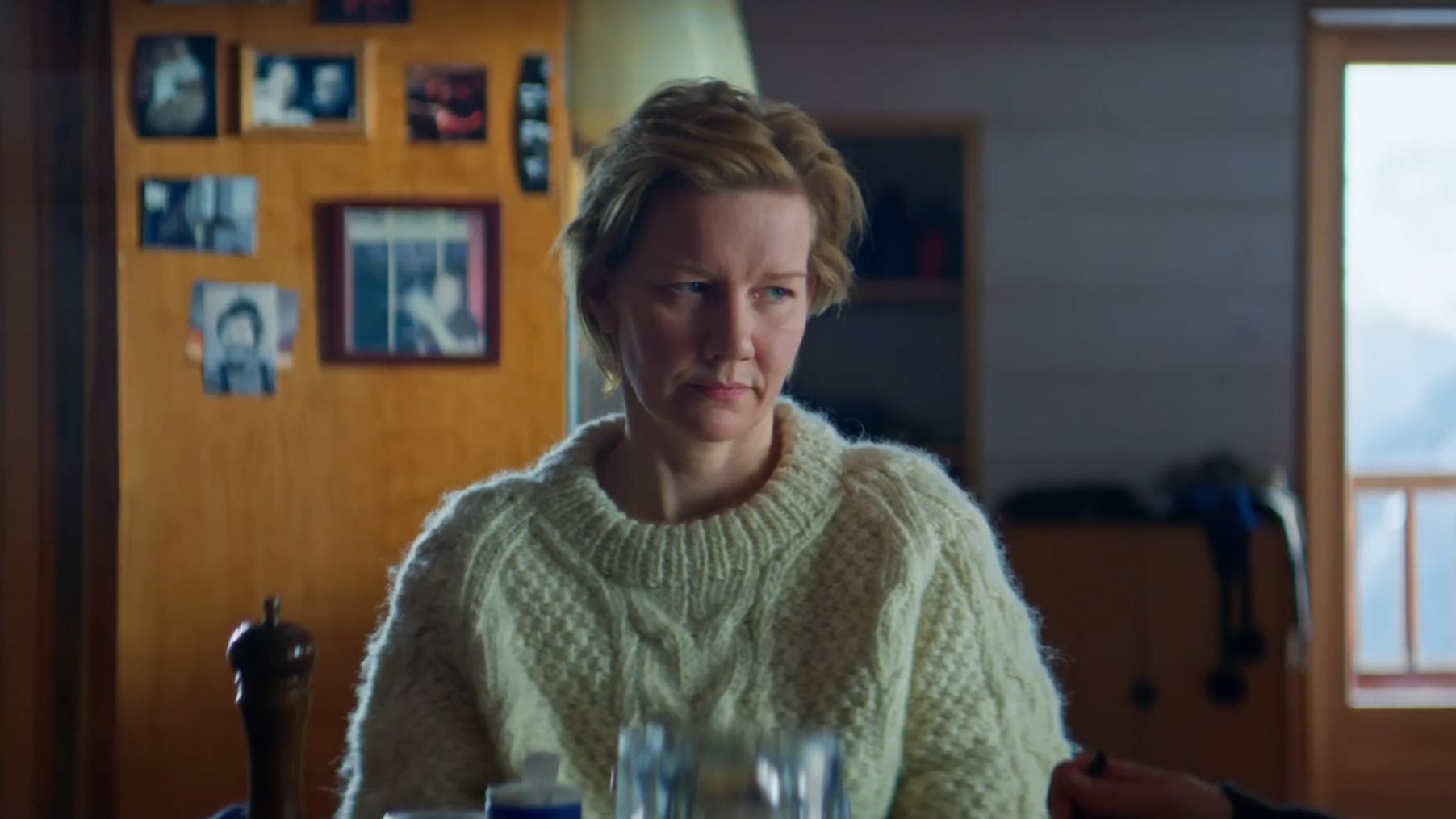Anatomy of A Fall (or Anatomie d’un Chute) (2023) is a French legal drama that enjoyed international release and acclaim. The full-length feature centers on Sandra (Sandra Hüllaer), a German novelist living in the French Alps who is suspected of the death of her French husband Sam (Sam Theis), a teacher and aspiring writer, when he falls and dies from a height at their chalet. The trial not only examines whether the death was the cause of murder or death by suicide but also examines the ins and outs of their deteriorating marriage and the role their son Daniel (Milo Machado-Graner) plays in that dynamic. The film was written by Justine Triet and Arthur Hirari and directed by Triet.
Sandra sports short red hair and is frequently seen in chunky wool sweaters or blazers suited for court appearances throughout the film. The use of both French and English interchangeably is a crucial plot and thematic element in the movie.
Sandra never shies away from her bi attractions or being described as bisexual. We often witness her expressing deep love for her husband, referring to him as her soulmate, and sharing affectionate glances in many photos. In the opening scene, she engages in an interview with student Zoé Solidor (Camille Rutherford), where flirtatious hints are suggested through gazes and expressions of interest. Additionally, there are moments where her defense attorney, Vincent (Swann Arlaud), confesses his love and attraction towards her. Towards the end of the film, Sandra appears to engage in light touching and emotional intimacy with him.
The film also uses the term “bisexual” in court to describe her, and Sandra never denies her brief affairs with women during the most trying times in her marriage to Sam, saying,
I can live without sex [from her husband, who has not touched her since her son’s accident], but not forever .. It’s not about who’s blaming who or who’s frustrating who. The frustration is there, and we’re both dealing with it. Me personally, I refuse to rot inside, so I find solutions. And at this point, sex was a question of personal hygiene.
Sandra’s relationship with Sam is loving and a meeting of the minds, but very complicated and strained both by life events and their own forms of expression. Most of Sandra’s other connections are sexual and as a form of release but no less legitimate, and usually as a point of tension release due to her stress with her husband or the complications of Daniel’s accident.

During a series of interviews for multiple press outlets, both Tried and Hüller were unafraid to discuss Sandra’s bisexuality, how it altered or humanized peoples’ perception of the character, and how it was one element of a larger picture in a story of a woman who is forced to defend and explain her life in a language she barely knows. Following is a selection of quotes from the press junkets:
From The Hollywood Reporter:
Triet: Doing the research for the film, I found it very interesting that even nowadays, in 2023, where (at least in France or in other Western countries) women are supposed to have equal status to men, life choices — like choosing a career, or being open sexually — are judged negatively. Sandra’s bisexuality is used against her in the case. I wanted to show how these trials are a kind of nightmare for people because your own life is taken away from you, everybody creates a fiction and are not not really trying to reach the truth.
For The Guardian:
Triet’s lead characters — notably in her 2016 comedy In Bed With Victoria and its psychodrama follow-up Sibyl — have been intellectually complex women who make no bones about their powerful sexuality. In Anatomy, Sandra’s bisexuality becomes a key piece of evidence in court. ‘When they can’t find enough evidence against her, they look at her lifestyle. They end up dissecting her as someone who’s not afraid to act, let’s say, egotistically, as they see it.’
And for Vanity Fair:
Hüller: “It’s very much a film about the audience and what their perspective is on a woman: on a successful woman, on a bisexual woman, on all these things — and how the thoughts on her change with every information they get.”
A few interesting side note:
In the final scene of Triet’s script, Daniel provides additional testimony that appears to ultimately result in Sandra’s acquittal. He emphasizes to his mother, who openly admits to using events from her life in her novels (a topic extensively discussed during the trial), that she must never use the trial or its events as source material for future works. Although this dialogue is omitted from the final cut, there is a palpable sense of a permanently changed relationship between the two characters.
As to the character’s actual guilt regarding the death of her husband, Huller noted that she asked the director at the start of filming whether the character was innocent or guilty. Triet did not give a definitive answer but instead told Huller to “play her like she’s innocent”. Hüller never found out whether the character did it or not.
Anatomy of A Fall portrays a main character who is strong, smart, and incredibly complex without shame, whether it’s about her sexuality, lifestyle, or work style. As the events of the story scrutinize every aspect of her life in the pursuit of her innocence or conviction, including her queerness, this element remains crucial to the narrative. It serves as a mature form of bisexual representation, even though it exists within a story that is inherently ambiguous and influenced by public perception.